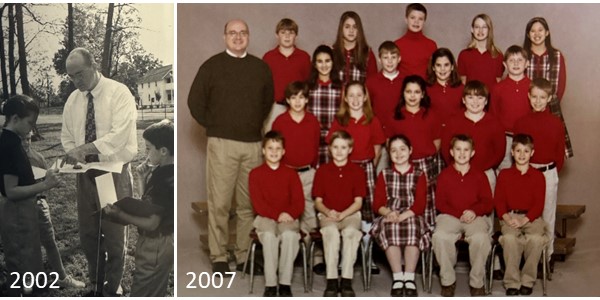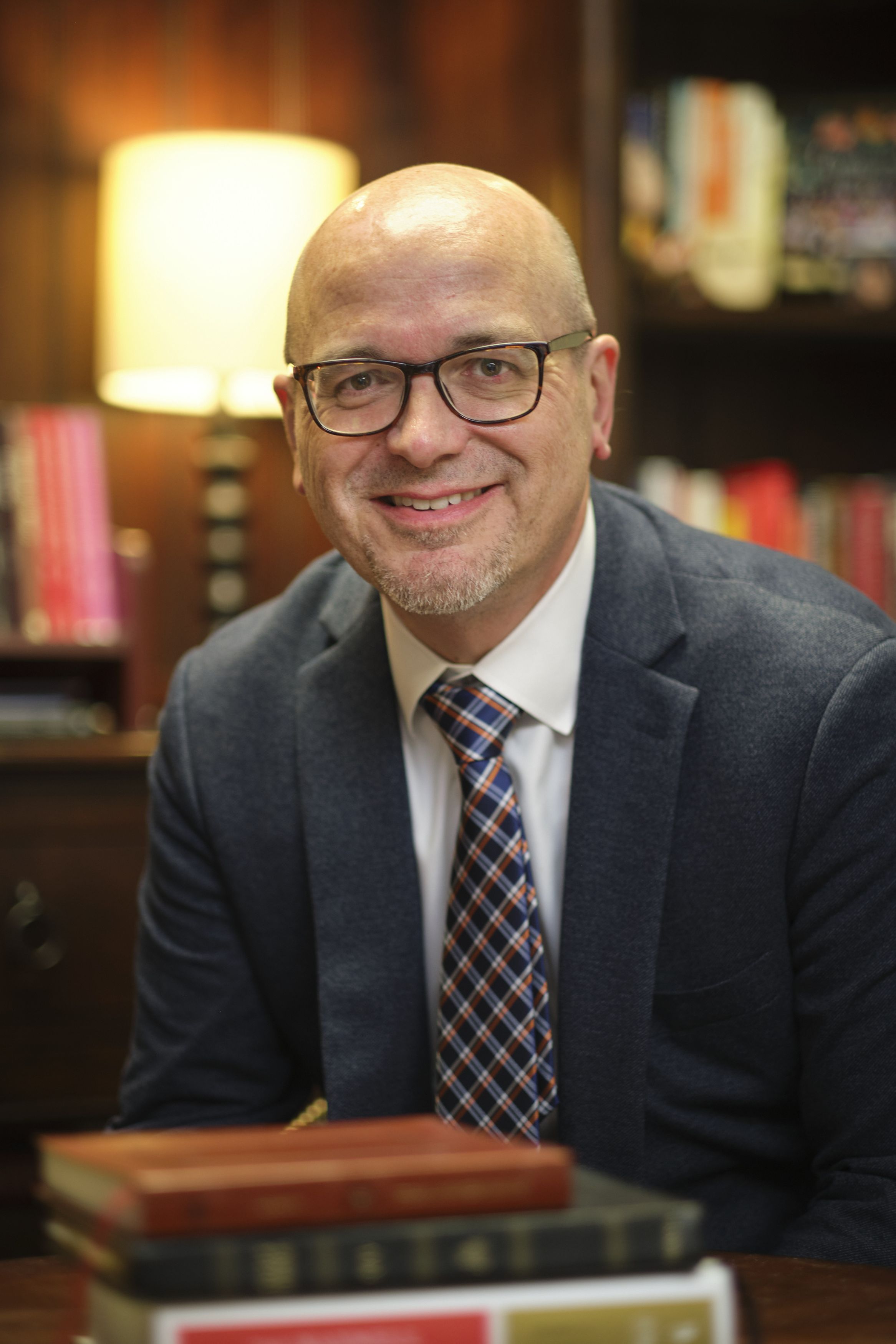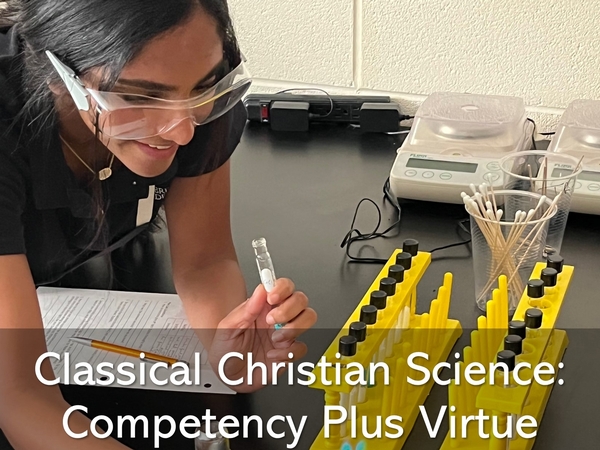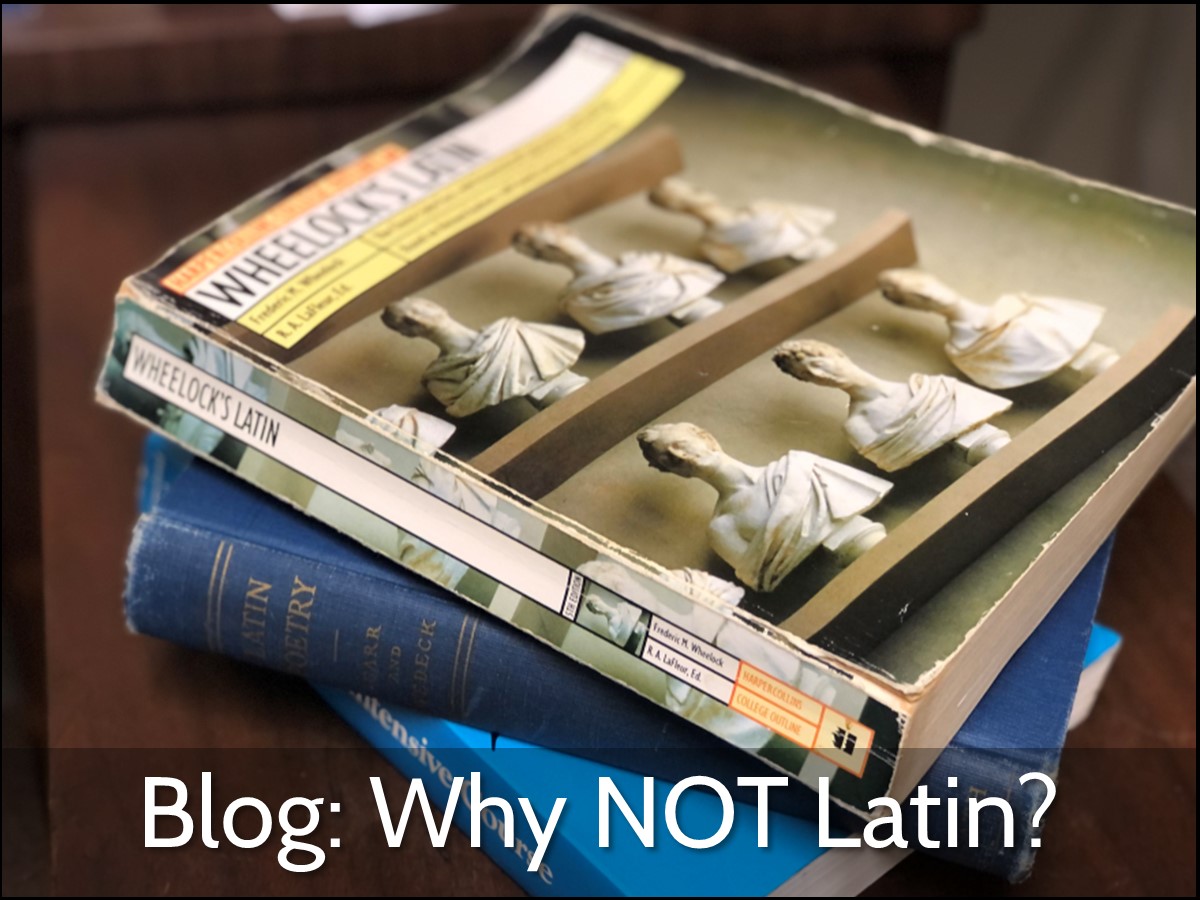Rockbridge Academy Blog
The Founding of Rockbridge Academy: Part of the 30-Stories-for-30-Years series

The founding of Rockbridge Academy is a testament to God’s faithfulness.
In 1994, three couples with toddlers and preschoolers desired a Christ-centered education for their children and godly training that reflected their own home training, but God specifically opened their eyes to classical Christian education through Recovering the Lost Tools of Learning. After meeting weekly for a year, praying, learning about classical Christian education, and attending the 2nd Association of Classical Christian Schools (ACCS) conference of then only 40 people, they decided they had no choice but to step out in faith and see if God would open a school. The founders then hosted twenty-five open houses featuring curriculum guides and resources on the kitchen counter. Though this yielded a number of interested parents, it did not yield committed families and applied students; so far, only the founders’ three school-aged children planned to attend.
In May 1995, after a potential family asked if the school was opening, the founders replied, “Yes.” Though there were no teachers, no students, no classrooms, no books, and no money, God provided everything just in time for the doors to open in September 1995. It was truly His work, and He made it clear by keeping the six founders on their knees until the last minute. They were all asking Him to provide, and that He did.
In July, before Rockbridge Academy opened, God provided three teachers. One was the Head of School, but they all knew they were not promised a paycheck. Nonetheless, they were convinced that classical Christian education was crucial, and they desired to be a part of it. For months, one of the founders searched to no avail for a facility to house the school, yet God provided one just in time. His provision became clear the fateful day when the pastor of the Baldwin United Methodist Church walked the founder to the church’s auditorium. The auditorium included a stage, and when the Pastor pulled back the stage curtains, it revealed a group of stacked student desks, chairs, and classroom boards—all left behind by the overcrowded county public school system which leased the building in the past.
Through God’s provision, Rockbridge Academy opened in September with 23 K-4 students. The school’s first parents took a risk and registered their children even before there was a school. Throughout the first year, they volunteered to sweep the floors and clean the classrooms because they were simply grateful and delighted to watch their children learn in this classical Christian setting.
Times were lean, and every paper clip was accounted for. There were no breaks or planning times for teachers, and, often during lunch, teachers quickly ran to a local store with an unreliable copier to make copies for their students. Despite all this, the staff of three received their paychecks each month—evidence of God's faithfulness.
By 1996, God tripled student attendance. Success is not measured by numbers, though, but by alone watching God’s hand at work. The founders witnessed the faithfulness of God in each step, and they desired that Rockbridge Academy would continue to be faithful and honor God for generations to come. This is why the hymn, Great is Thy Faithfulness, is sung year after year at Rockbridge Academy.
The Founders and Founding Staff:
Rob Tucker — chairman of the Rockbridge Academy board, 1995-2011; a permanent member of the National Board of the Association of Classical Christian Schools (ACCS). As a visionary, he kept the mission of RA in the forefront from the conception of the school to many years thereafter.
Laura Tucker (author) — teacher training, curriculum writing and implementation, student progress oversight, Director of Instruction, (1995-2011). ACCS national conference speaker since 2000. Since 2012, she has served Rockbridge Academy as an educational diagnostician and currently assists with the opening of Rockbridge Academy’s Paideia School.
David Hatcher — pastor of Bay Area Community Church; spiritual insight and
leadership of the school; now pastor of Trinity Church in Seattle, WA.
Kim Hatcher — music teacher at Rockbridge Academy.
After the 1996 academic year, David and Kim moved to Seattle, Washington and founded a church and another school, Providence Classical Christian School that continues to serve families. Their severely disabled son was the first student with special needs to attend in 1995, when the Special Needs program was born.
Mark Lease — a talented builder and businessman, he constructed walls and moved structures in record time to allow the school to open. In the early years of Rockbridge, Mark had oversight of the school’s business operations. In later years, he was the school’s superintendent and on the board.
Kathy Lease — When the school opened, Kathy initiated the school’s first weekly parent-comprised prayer group. A few years after the school opened, Kathy went to be with the Lord; the Rockbridge Academy prayer group continues to meet weekly to this day, which was her hope.
God used the founders’ unique gifts to open the school. It was the Body of Christ at work.
Leslie Collins — Head of School, Kindergarten teacher, and founder of the special needs program. Leslie served as the Head of Rockbridge Academy from 1995 to 1999, then served as Admissions Director for the next few years while her husband, Dave, began as our first operations and facilities staff. Currently, Leslie is the Head of Covenant School, a classical Christian school in Texas.
Gail Brophy Erb — 3rd and 4th grade teacher until 1999. She is the Head of a classical Christian tutorial in Idaho.
Jennifer Crook Schingeck — taught 1st and 2nd grades and continues to teach at Rockbridge Academy where her five children attended and her husband, Bob, works.
What’s in the Name?
There is nothing extraordinary about the origin! Rob and I were driving home from vacation in North Carolina and passed a street sign that had Rockbridge written on it. We thought that it would be a good name for the school. (Christ the Rock and Christ the bridge to God). The other founders agreed.
The Good, The Beautiful, and Cursive

Such a concern for beauty reveals the values underlying a classical educational model and their distinction from the values of a modern educational model. We believe that education aims at the good, true, and beautiful. If education aims to train students in beauty, then the form of education, even down to the letters with which we write our spelling words, ought to likewise aim at beauty.
Some weeks ago, as I was explaining my role as a teacher at a classical Christian school to several peers, we began to discuss the topic of cursive. I lauded the grammar-age children at my school, who use cursive for nearly all their daily work. “But why is cursive good?” a peer then asked me. I was tempted to answer that cursive is good because it is beautiful, but I knew such an answer would not satisfy him. Though I wished to be able to rattle off five clear reasons why writing in cursive is better than print handwriting or typing, I could not, and, as such, my peer’s question forced me to reflect.
In my reflections since our conversation, I have thought several times of Wendell Berry. Wendell Berry is a writer whose stories and novels often revolve around themes of community, place, and tradition; I was first introduced to Berry by Rockbridge’s own Mr. Vaughn.
Berry attempts to resist a life of screens and machines. In this resistance, he writes his books by hand, and his wife types his work on a typewriter. In his short but widely-circulated essay “Why I am Not Going to Buy a Computer,” Berry expresses his distaste for computer companies and other companies of their ilk, saying that he wants to be “as little hooked to them as possible.” Yet Berry’s argument against computers relies on the fact that he, as a writer, does not want to use a tool that degrades his work instead of improving it. Berry writes:
“My final and perhaps my best reason for not owning a computer is that I do not wish to fool myself. I disbelieve, and therefore strongly resent, the assertion that I or anybody else could write better or more easily with a computer than with a pencil. I do not see why I should not be as scientific about this as the next fellow: when somebody has used a computer to write work that is demonstrably better than Dante’s, and when this better is demonstrably attributable to the use of a computer, then I will speak of computers with a more respectful tone of voice, though I still will not buy one.”
Now, I’m not sure if Mr. Berry writes in print or in cursive, but his preference for handwriting over typing makes a statement about his beliefs. Berry believes that some forms of writing—and living—are more conducive to truly good work, to the genuine expression of beauty and truth, than others. Berry believes that innovation and ease are not sure means to the end of good work. Berry’s stance suggests, too, that form matters: how we work has an impact on the fruit of our work. How we write has an impact on what we write.
Instinct attests to the above proposition. We know that form matters: without question, we know that a lecture attended in a classroom, given by a teacher whom we know, will be more memorable than a lecture viewed on YouTube. The former allows us to receive the speaker’s wisdom more directly, due to our shared presence in the classroom. While the latter may be more accessible, its form is not as conducive to learning. Likewise, we know that a poem printed in a bound book will command more of our attention than an Instagram post claiming to be poetry. As many have written, a conversation in person is more likely to have a deeper and more personal effect than a conversation over messaging software.
In short, the meaning of a thing relies in part upon the form of that thing, the way that it is communicated. Or, in the famous words of media critic Marshall McLuhan, “the medium is the message.” We know that the medium or form of anything impacts its meaning, and yet we often neglect to recognize the implications of such a principle. But this principle has implications for many areas of our lives—from evangelism to education, and even in handwriting.
Cursive, as a form of handwriting, ennobles the written word in a way that type, and even print writing, do not. The form of cursive lends significance to the written content. This is part of why classical Christian schools emphasize cursive, a skill otherwise considered outdated and unnecessary.
Cursive, as a form of handwriting, ennobles the written word in a way that type, and even print writing, do not. The form of cursive lends significance to the written content.
In a classical Christian school setting—like that of Rockbridge, where I was educated, or that of the school in Pennsylvania where I recently taught—we want to teach our students that their work is important. What students at these schools write is not mere chicken-scratch. What students write are not simply notes to be thrown away. What students write is, instead, an integral part of and a representation of what they are learning. Some of their assignments are more important than others—composition paragraphs are more important than extra math calculations, completed on “scratch paper.” But all of their work is still important. And because we want to teach children that their written work is a vital part of their education, we teach that it is important that the form of that work‒‒that is, the students’ penmanship‒‒be well-ordered, and not only well-ordered, but beautiful.
Such a concern for beauty reveals the values underlying a classical educational model and their distinction from the values of a modern educational model. We believe that education aims at the good, true, and beautiful. If education aims to train students in beauty, then the form of education, even down to the letters with which we write our spelling words, ought to likewise aim at beauty.
A friend of mine, herself now a teacher at a classical Christian school, put it this way: “A century ago, penmanship was a significant part of school curriculum, with methodologies, textbooks, and handwriting drills devoted to it… Emphasizing excellent penmanship in the school setting would train students in a teachable skill that brings a sense of beauty back into learning.” Penmanship itself is an art, one little talked of today. Like any art or skill, penmanship requires a dedicated effort and time, but it also produces rich rewards.
For instance, studies show that cursive not only activates different areas of the brain than print writing, but that it develops more fine motor skills than print writing or typing, because, as one teacher writes, cursive letters “must be connected in a smooth and continuous motion. This can help students develop their hand-eye coordination and fine motor skills, which can have benefits beyond writing.”
In addition to the “sense of beauty” brought by cursive penmanship, secondary benefits of cursive have been marked by researchers and teachers alike. For instance, studies show that cursive not only activates different areas of the brain than print writing, but that it develops more fine motor skills than print writing or typing, because, as one teacher writes, cursive letters “must be connected in a smooth and continuous motion. This can help students develop their hand-eye coordination and fine motor skills, which can have benefits beyond writing.” Cursive can also help children retain more of the information they are learning, as an article from Time magazine tells.
Apart from its usefulness, cursive brings beauty and even joy. How excited students are when they can finally sign their name in cursive! How proud they are of a neat page of cursive writing! A thing well done is a delight, and so, too, is a thing well-written.
I, too, have felt this delight. Before I began teaching grammar-school students, I had to refresh my memory of cursive. It came back to me easily, as I had been well-trained in penmanship as a grammar-school student at Rockbridge but slowly lost my handwriting skills when typed assignments became the norm in my education. Since taking up cursive again, I have found all my written work to be not only more beautiful but more enjoyable. A thing of beauty—even something as seemingly inconsequential as penmanship—is, as the poet John Keats once said, “a joy forever.”
Perhaps my instinctual response to my friend—that cursive is good because it is beautiful—was not, after all, so far off the mark.
This essay originally appeared in Voegelin View. The above version was edited slightly.
Sarah Reardon (née Soltis, Class of 2020) taught at a classical Christian school in Philadelphia. Sarah graduated from Grove City College in 2023, and her writing has appeared in publications such as First Things, Plough, Public Discourse, among others.
Art, of Course! Four Tenets of Classical Christian Art

In art, we are ultimately educating students toward a deeper knowledge and love for God and our neighbor. We are teaching a fear of the LORD which is the beginning of wisdom (Proverbs 9:10). In Hebrew the word for “wisdom” means “skillful with the hands,” evoking handiwork done with care and knowledge.
Rockbridge Academy has a weekly art course, from grades 1 through 8 as well as a chosen elective for grades 7 through 12. We invest time in the schedule, space in the building, and money in the budget. We grade participation, memorization, worksheets, and projects. Art is taught classically at a grammar, dialectic, and rhetoric level. We know this high view of art education is counter-cultural since we witness art and music being the first courses that drop during a time, space, or budget crunch. Yet, here it is, art as a cherished part of education, not as a “second recess.” John Ruskin said, “Fine art is that in which the hand, the head, and the heart of man go together.” Thus, classes elicit the student’s concentration and diligence, encouraging their best work with carefulness and neatness. In this environment students can produce their best work with a sense of delight: “Aaah, I did that—and it is good!” This sentiment should evoke thoughts of our Creator. An inescapable fact of our humanity is that we bear the image of God and thus have a deep desire to create good work with joy and thanksgiving. Genesis 1:31 states, “And God saw everything that He had made, and behold, it was very good.” In this article I describe four attributes or goals of a classical, Christian art education. There may be more, but these stand out as foundational. Thus, I am calling them the four tenets of a classical, Christian art course.
1. See and Apprehend God’s Glory
The first tenet of a classical, Christian art education is to help students see and apprehend God’s Glory. That is, to show the excellence of His character and providence in our finely-tuned, complex creation. The Westminster Confession of Faith states, “The chief end of man is to glorify God and enjoy Him forever.” There is true enjoyment in gratefully appreciating God’s creation, learning to observe it well with joy. Theologians describe two “books” of God’s Glory: Creation and Scripture. Psalm 34:8 and Psalm 19:1-4a state:
“Oh, taste and see that the LORD is good!
Blessed is the man who takes refuge in him!
The heavens declare the glory of God;
The skies proclaim the work of His hands.
Day after day they pour forth speech,
night after night they reveal knowledge.
They have no speech, they use no words;
no sound is heard from them.
Yet their voice goes out into all the earth,
their words to the ends of the world.”
In art, we are ultimately educating students toward a deeper knowledge and love for God and our neighbor. We are teaching a fear of the LORD which is the beginning of wisdom (Proverbs 9:10). In Hebrew the word for “wisdom” means “skillful with the hands,” evoking handiwork done with care and knowledge. As students learn to carefully observe the world, they perceive its intricate complexity. They notice patterns, symmetry, proportions, rhythms, ratios, and harmonies. Students witness the Golden Ratio, the Fibonacci Sequence, and many varied sophisticated designs in forests, feathers, and our double-helix DNA strands, for example. All of creation speaks visually of our gracious, kind Creator who is all-powerful, sovereign, and trustworthy. Students may begin to understand why the angels, the Seraphim call to one another, “Holy, Holy, Holy is the LORD Almighty, the whole earth is FULL of His Glory!” (Isaiah 6:3).
2. Understand the Flow of Art History
The second tenet of a classical, Christian art course is that it is based on the flow of art history. Here is another view of God’s story. Students can begin to understand the progression of world views through history as they are seen in various cultures’ artwork. For example, how do we know what the Egyptians believed to be true or important except through the art which is left for us to observe and study? And consider, is there a reason why one art era moved to another? As we study reactions to various world views, we can see what could be happening as the philosophy of cultures change through time.
Students also notice that some aspects of humanity are similar throughout time and space, pointing again to our Maker. For example, all over the world, and since the earliest of times, mankind has sought a God or gods, felt closer to Him or them on a mountaintop, and felt a debt, a need to sacrifice, to give to this higher power. Where did all this come from? Ecclesiastes 3:11 says, “He has made everything beautiful in its time. He has also set eternity in the human heart; yet no one can fathom what God has done from beginning to end.”
The students witness themselves being part of an extremely large picture. They gain an understanding of the foundation and rise of Christianity. They realize they are not alone, they live in community, in a continuum of time, connected to a legacy of thought. It is like witnessing a very long conversation with many members from the beginning of time. This aspect may not seem important but consider that one of the goals of public education is to dispel this truth. John Gatto was awarded New York Teacher of the Year in 1990 and 1991. His revealing book, Dumbing Us Down describes his classes this way: “The first lesson I teach is confusion. I teach everything out of context… I teach the un-relating of everything. I teach disconnections. I teach too much: the orbiting of planets, the law of large numbers, slavery, adjectives, dance, surprise guests, pull-out programs, standardized tests… What do any of these things have to do with each other?” Their goal is for students to witness disconnection and confusion, not order and harmony. I recall Dostoyevsky’s revelation in The Brothers Karamazov, “the awful thing is that beauty is mysterious as well as terrible. God and the devil are fighting there, and the battlefield is the heart of man.” Consider now that an objective of public education is to use various subjects to purposely instill chaos, confusion (babel), not connection, peace, or wisdom. This is an intentional strategy of the enemy to dismiss the beauty of God, including the beauty of creation and divide the community we have with one another.
3. Integrate Other Subjects with Art
This is where I declare that I have the BEST job at Rockbridge Academy: teaching art! Various parts of all subjects come together in our art lessons revealing an orderly whole. These connections are unavoidable and they are unexplainable without considering the work of a powerful Creator…Look for it with me—there is art in every subject and every subject in art.
And here we have a smooth segue to the third tenet of a classical, Christian art course: Integration. Rather than disintegration, art lessons reveal integration across subjects. Truly, we live in a universe, not a pluriverse. As teachers, we are intentional in revealing integration. This is where I declare that I have the BEST job at Rockbridge Academy: teaching art! Various parts of all subjects come together in our art lessons revealing an orderly whole. These connections are unavoidable and they are unexplainable without considering the work of a powerful Creator. We’ve already seen a connection of art with history, geography, philosophy, and Bible. Consider also the many Latin root words we review. Proportion is a stem of “proportio” meaning an analogy of parts. Duplication is to draw something a second time. Chroma is color. Primary colors are the first ones. The list goes on and on. Additionally, we often have math lessons. We teach value as the weight of black and white, or of a color. We literally work on geometry while studying shape, form, perspective, and ellipses. We also consider science since artists study nature to draw it well. It wasn’t too long ago that to be a great scientist you had to be a great artist—drawing what you saw in the natural world. Artists were chemists as well, mixing their own paints. We connect our color and composition lessons easily with music: rhythm, patterns, harmony, disharmony. After all, tone is color. I recall my daughter describing a lesson her music teacher at the time (Mrs. Ball) gave to the choir, “that is a bright red tone, try to make it more of a mauve…” This instantly communicated a more correct harmony. Finally, as art teachers, we require our students to write well, not just with proper spelling and grammar, but with their neat handwriting. Look for it with me—there is art in every subject and every subject in art.
4. Teach Skills of the Craft
Lastly, the fourth tenant of a classical, Christian art course is simply that we teach definite skills of the craft. In other words, we do not hand students a blank paper and ask them to draw whatever they feel. Oh, how overwhelmingly self-conscious and intimidating that could be. Rockbridge Academy’s art curriculum is purposely drawing-heavy. Our lessons begin (and continue) with, “draw what you see, not what you think you see.” Students grow in their ability to patiently draw with accuracy. They may grow-up to become an artist or they may just need to confidently draw what they see in a microscope, doing so without fear, being able to gain an even deeper understanding of what they are seeing by drawing it correctly.
Classical in nature, our art education involves students imitating forms in life and duplicating other masterpieces. They grow throughout the curriculum and move toward greater sophistication. We seek to generate enthusiasm, joy, and wonder as well as provide lessons in real skills for the students to practice, real information for them to learn, sensing a real love that we have for them as our students and for God as LORD of creation, and God of Wonder.
All this work and wonder is wrapped up nicely in the spring when the Rockbridge Academy community comes together to enjoy the Fine Arts Showcase. Don’t miss it.
Take a look at the past Rockbridge Academy Blakey Prize winners HERE.
Therese Cooley, upper school art teacher, has been a part of the Rockbridge Academy faculty and staff since 2006. She has also taught grammar school art and the photography elective and helped with the yearbook and communications over the years. She and her husband, Roger, have five Rockbridge alumni children and four precious grandchildren.

28 Faithful Years of Life Together

Mr. Roy Griffith, our headmaster, started his journey at Rockbridge Academy in 1997 as a 5th grade teacher joining this start-up classical Christian school. That marked the third year of the school and already it had grown from 23 students the first year to nearly 100. Few people had ever heard of classical education and even fewer of classical Christian education (CCE). Rare indeed were those willing to stake a career on it when no Rockbridge graduates even existed, and we had never taken a Grand Tour before.
Did this educational methodology actually work? We know the answer today is a resounding, yes, as CCE is now a fast-growing movement. But what was Mr. Griffith thinking 28 years ago? What led him to change careers from an architect to 5th grade teacher? What changes has he seen in CCE, and how is Rockbridge Academy poised to approach the next 30 years? Mr. Griffith shares his story, some of the challenges of the early years, and some words of advice to those just starting their classical Christian educational journey at Rockbridge Academy.
What were you thinking 28 years ago when you changed careers from an architect to a 5th grade teacher with four young children?
When I came to Rockbridge Academy, my wife, Donna, and I were chasing our first two of eventually, four kids and were deep into learning how to parent as Christians. Ever since we had brought our oldest home from the hospital, one thing persistently tugging on our souls was the conviction that if Ephesians was telling us to bring up our children, "in the fear and admonition of the Lord," it required us to be all in. We quickly awoke to how central education would be to forming not just their minds but the heart convictions our kids would carry into adulthood. So when I visited Rockbridge Academy during their opening year in 1995, I walked in thinking about an eventual school for my boys, but walked out personally captivated by the classical Christian vision. A thoroughgoing K-12 discipleship of the mind and heart anchored in the sovereignty of Christ and embracing the role of the whole family resonated in my soul. Months later, I couldn't get that vision out of my head, and I really believed the Lord gave me a burning desire to be part of that mission as a teacher. It wasn't an easy decision, as it meant long hours and a significant pay cut. When I proposed the career change to my wife, she responded wryly, "Well, we can try anything for a year." It was a defining moment. God has His ways, as one tentative year turned into twenty-eight.
So when I visited Rockbridge Academy during their opening year in 1995, I walked in thinking about an eventual school for my boys, but walked out personally captivated by the classical Christian vision. A thoroughgoing K-12 discipleship of the mind and heart anchored in the sovereignty of Christ and embracing the role of the whole family resonated in my soul.
How did you experience God's faithfulness as you took these steps of faith?
The early years were hard but rewarding. I had never before thought I would be a teacher, or thought I had a knack for it. But the Lord hollowed out a little space just for me, and I flourished in the classroom. At the same time, like many start-up Christian schools, all the teachers at Rockbridge literally worked below the poverty line, which had its own stresses. Meanwhile, God surrounded us with a precious school community who cared for our family. Food would show up at our door unannounced. Families took us along on their vacations. I remember one Christmas, a Rockbridge family left a gift anonymously at our front door each night for two weeks leading up to the holiday. We tried hard to catch them in the act, but they were really stealthy. It was both hilarious and heartwarming, and while we had our suspicions, we never found out who it was. My kids were spellbound by the surprise each night. Through it all, both the rewarding moments and the times of greatest stress and difficulty, we look back and see the Lord's hand. As I've come to realize, when God called us to this, He began a discipleship not just of my kids, but of our whole family.
Through it all, both the rewarding moments and the times of greatest stress and difficulty, we look back and see the Lord's hand. As I've come to realize, when God called us to this, He began a discipleship not just of my kids, but of our whole family.
What were some of the challenges you and those early teachers and administrators faced?
The greatest challenges by far came because none of us had been classically educated. While we were standing on the shoulders of a few slightly older schools trying to do the same thing, everything had to be built from scratch. From curriculum and lesson plans to traditions like feasts and history parades, to figuring out how to shape distinctively classical and Christian music and athletics programs, teachers and administrators were constantly trailblazing. Pioneering is tiring, often hard on relationships, and always fraught with mistakes. We look back on lots of mistakes. (We still make mistakes.) I think the Rockbridge Academy Core Values we articulated distilled from many hard-fought lessons in those early years and helped define who Rockbridge Academy has always aspired to be.
Have you seen the classical Christian education model change over the last 3 decades?
I would say that the classical Christian model itself has not fundamentally changed in three decades. Rather, I think our collective understanding of this education, one that had to be recovered from the distant past, has grown tremendously. In light of that fact, I think we have learned to approach the act of educating classically far more humbly than we used to.
Some would argue that true classical education cannot exist without Christ. What are your thoughts?
At the risk of losing any of our aforementioned humility, I'd say, "absolutely!" But to back up, answering this question requires us to think historically. Certainly, the educational model of ancient Greeks and Romans developed in a pagan context, and those societies raised some of the greatest philosophers and statesmen in Western History. Early Christians saw what a powerful tool the Greco-Roman culture had developed. But they also realized that all good things only come by the common grace of the Creator, and that Jesus Christ is sovereign over all knowledge. So what we know today as classical education with all the beautiful trappings is something brought to its fullness in the Christian Middle Ages, which purposely threaded the model with deeper truths of the Scriptures. So, while it's possible to just teach classically, we need to remember how empty the wisdom of the world can be.
How do you see Rockbridge Academy growing and poised to contribute in the next 30 years?
We are in an exciting time in classical Christian education. The resiliency of this model of education compared to others became very apparent during COVID, so classical Christian schools and homeschool tutorials are now popping up everywhere and flourishing. Because Rockbridge Academy has almost 30 years of trial and error in this space, God has positioned us to have a leading impact on this part of God's kingdom. In many ways, that is already happening through our Summer Teacher Training Conference, hosting classical Christian student teachers, and our semi-annual spring ACCS Auxilium conference for start-up schools. We are actively collaborating with greater organizations like ACCS (Association of Classical Christian Education) and SCL (Society for Classical Learning) to expand upon that influence. But as we too experience growth within, our campus is only so big. I tell people, I never want our campus to grow so big that I can't eventually learn everyone's name. So that means further growth could take many forms, including supporting the classical Christian homeschool movement, planting a satellite campus, or expanding specialized programs for both neurodivergent students or students with more profound disabilities. This is why we must remain prayerful. I'm confident the Lord will lead in a way that causes Rockbridge Academy to continue to accomplish its mission to Christian families.
What advice do you have for young families and teachers starting their CCE journey at Rockbridge Academy?
Go to church. Study God's Word. Actively pray. Raise your kids in the fear and admonition of the Lord with intentionality. Love on your children's teachers and get to know them. Walk humbly before God as you figure out who your kids are, and once you think you have, prepare for them to change as they grow. Know that doing all of these things, including sending your child to a Christian school is not a formula for success; it is simply acting as obediently as you can. So finally, trust God with the results of each day and each decade they are under your roof.
 Roy Griffith joined Rockbridge Academy as a 5th grade teacher in 1997. He transitioned to grammar school principal in 2012 and then in 2015 took on the role of interim headmaster to headmaster in 2016. Roy's wife, Donna, has served in various roles in Rockbridge history and today uses her gifts in multiple areas of coaching and care coordination for the elderly. Roy and Donna's four children are Rockbridge alumni: Elyse (2019) living locally and finishing her business degree at UMD, Grace (2018) married to Nathan Harrison (2017) and living in Charlotte, NC, Drew (2015) married to Anna (Krauss, 2015) living in Phoenix, AZ, and Nate (2013) married to Emily (Comeau) and teaching upper school science at Elizabeth Seton High School in Bladensburg, MD.
Roy Griffith joined Rockbridge Academy as a 5th grade teacher in 1997. He transitioned to grammar school principal in 2012 and then in 2015 took on the role of interim headmaster to headmaster in 2016. Roy's wife, Donna, has served in various roles in Rockbridge history and today uses her gifts in multiple areas of coaching and care coordination for the elderly. Roy and Donna's four children are Rockbridge alumni: Elyse (2019) living locally and finishing her business degree at UMD, Grace (2018) married to Nathan Harrison (2017) and living in Charlotte, NC, Drew (2015) married to Anna (Krauss, 2015) living in Phoenix, AZ, and Nate (2013) married to Emily (Comeau) and teaching upper school science at Elizabeth Seton High School in Bladensburg, MD.
Education Must Be More Than Just Classical

"Virtues are hard things,” quipped National Review writer Daniel Buck in a recent opinion article entitled “The Virtues of Classical Schools.” Buck continued: “Fail a test of courage or act unwisely and virtue will demand justice or forgiveness. Values are subjective, virtues objective. The former is a preference, the latter a firm statement of right and wrong, true and false, good and evil.”
Examining one Hillsdale-launched classical charter school, Lake County Classical Academy (LCCA), Buck argues that although classical schools bear some similarities to their public counterparts, classical educators stand apart from our culture in that they are not afraid to incorporate structure and objective values into their pedagogy, policies, and classroom life.
As a graduate of a K–12 classical Christian school and a current teacher at another classical Christian school, I appreciated much in Buck’s article. Indeed, while much of public education rests on slippery, subjective foundations, classical education can rest on objectivity and uphold structure and hierarchy in the classroom in a way that benefits students and prepares them to comprehend truth and virtue.
Yet, as I finished Buck’s article, I couldn’t help feeling that he failed to explain significant attributes of the school he profiled and the classical-education movement in general. For instance: Who gets to define what virtue is, what “right and wrong, true and false, good and evil” are? What is the foundation from which these schools draw the objective truths they teach? For public charter schools such as LCCA, these questions cannot be fully answered, since such questions require a religious framework. One cannot define goodness and truth apart from an ultimate source of goodness and truth.
One cannot define goodness and truth apart from an ultimate source of goodness and truth.
Classical charter schools like LCCA have bloomed around the country, thanks to Hillsdale’s Barney Charter School Initiative and to the success of programs such as Great Hearts Academies and Valor Education. But the origins of today’s classical-school movement — origins that Buck did not mention — lie in a distinctly Christian understanding of classical education. As Emma Green documented in an extensive New Yorker article published earlier this year, today’s classical-education movement began with four Christian schools inspired by the vision of education held by Dorothy Sayers, a Catholic, and launched in the 1980s. In the 21st century, classical education has grown more pluralistic, thanks to the rise of classical charter schools and private classical schools without religious affiliation.
But classical education without Christ is not only oxymoronic, it is futile in an ultimate sense.
This portion of the article was republished with permission. Click HERE to continue reading Sarah Reardon's article in the National Review.
Sarah Reardon (class of 2020) is a graduate of Grove City College with degrees in English and classical studies. She wrote for GCC's newspaper, The Collegian, and the cultural magazine, Cogitare Magazine. She has contributed articles to Front Porch Republic, The American Conservative, National Review, and several online literary magazines.
Classical Christian Science: Competency Plus Virtue

"Science is the search for the truth.”
– Linus Pauling, founder of Quantum Chemistry & Molecular Biology
Imagine a medical student memorizing cardiovascular system pathology for his licensing exam. Picture a pilot polishing up her landing skills in an aircraft simulator. Think of a teenage boy playing a car-racing video game. When does the medical student learn compassion for his patients? How does the pilot train for the courage that gives her a steady hand? Which game module teaches the adolescent driver good judgment? All three scenarios present a person who has trained for hours, weeks, or even years honing the skills necessary for their vocation; yet all three are missing elements essential to their roles. In contrast, a classical Christian education seeks to develop the whole person from competency to relationship to virtue. At Rockbridge, science classes are no exception.
Consider a scientist who has completed all the necessary education to be a leader in her field. She is familiar with cutting-edge research, and she has the analytical skills to design and build solutions. But in which class did she learn to appreciate the complexity of real-world problems? What research did she do on the ethics of her specialty? How much training has she had on written and oral communication to experts and decision-makers in the broader world? Modern scientists are trained to be competent, but lack preparation in interpersonal skills and moral character.
Science knowledge has exploded in the last century. The reflex response in education has been to cram more technical skills into the science classroom. In contrast, a liberal arts education is larger than the mere transmission of technical information. Modern classical science aims to combine practical knowledge with transformation of the social and personal aspects of a student’s character. As a classical Christian school, Rockbridge Academy pursues this transformation in light of biblical truths which develop the student as a bearer of the imago Dei.
In the dialectic years, students cultivate disciplined mental habits through systematic training in logic and Latin. As they move into rhetoric science, the focus shifts to developing habits in both computational and analogical thinking. While memorization and repetition are important, we eschew any method that limits learning to regurgitation of facts and algorithms in order to pass a test. Robust learning must be held in tension with contemplation, wonder, rest, and connection to the narrative of science, the story through which we see God’s incredible creation.
Do nothing from selfish ambition or conceit, but in humility count others as more significant than yourselves. Let each of you look not only to his own interests, but also to the interests of others.
– Philippians 2:3-4
The prevailing secular model for bright students seeking to make an impact on the world is a laser-like focus on areas of self-interest: grades, accolades, and individual accomplishments. As Rockbridge students build a foundation of scientific competency, we seek to create an environment which is truth-seeking for the benefit of the whole, not advantage-seeking for the benefit of the one. Rhetorical skills in speaking and writing are developed and used to teach and mentor others. Students are encouraged to ask questions about science and faith as they practice thinking deeply and putting difficult thoughts into words. They are led to see their developing abilities in the light of humility and stewardship: the humility of seeking truth rather than seeking rewards, and stewardship of the earth as we partner with God to be redeemers of culture and creation.
Foremost, our goal for the students at Rockbridge Academy is to guide their journey into full personhood. From the early days of grammar school until the final year of rhetoric, science students are encouraged to order their loves as they seek knowledge. We worship the Creator and have confidence in Him alone. We learn with boldness and purpose, not with fear of an unknown future. Our posture toward truth is one of awe as we see the Creator’s fingerprints on all of creation. We pray for students to leave these halls with every part of their education integrated into a whole, harmonious person: able to fulfill God’s call as stewards of creation, liberated in the freedom of Christ.
Robyn Kennedy has a degree in chemical engineering and a background in manufacturing and data acquisition systems. She teaches upper school science at Rockbridge Academy. Her husband is a retired Navy captain, and she and her family have served our country for many years at duty stations all over the world and around the country. She has four children and three of them are currently students at Rockbridge Academy.
The Roots of Rockbridge Academy

Like most great things in this world, Rockbridge Academy was born out of a problem. In 1994, a few like-minded couples with children reaching school age began to ask the question, “How are we going to educate our kids?” These parents desired a Christ-centered education for their children, yet as they surveyed Maryland's education landscape, they found it severely lacking. Not willing to settle when it came to their children, and especially their children’s relationship with the Lord, these couples set out upon a journey that led to the founding of the school we know and love today. Out of prayerful consideration, dedicated work, and God’s faithfulness, Rockbridge Academy came to be.
Out of prayerful consideration, dedicated work, and God’s faithfulness, Rockbridge Academy came to be.
Rockbridge Academy was founded by Rob and Laura Tucker, Dave and Kim Hatcher, and Mark and Kathy Lease: six parents with strong faith and a clear mission. One of these founders and mother of two Rockbridge graduates, Laura Tucker, says she and the other parents “desired to have a Christ-centered education for [their children] and godly training that reflected their training at home.” Tucker imagined a situation in which the training her children received at home and at school flowed seamlessly together, all pointing toward Christ. Jana Trovato, a parent of five Rockbridge graduates who became a part of the Rockbridge family in its third year, explains that this would look like “subjects taught under the Word of God, from teachers and staff that love God, who loved what they taught, who were aiming to live faithfully to him and to encourage their students in their relationship to Christ.” Clearly, an education in which Christ is foremost was important to Rockbridge founders and early families.
Clearly, an education in which Christ is foremost was important to Rockbridge founders and early families.
With this mission in mind, these parents began to prayerfully consider their options. Trovato cites Recovering the Lost Tools of Learning by Douglas Wilson as a resource that greatly influenced the start of Rockbridge. Recovering the Lost Tools of Learning provides a practical approach to the principles of classical education as outlined by Dorothy Sayers in her essay “The Lost Tools of Learning.” Trovato explains that Rockbridge is “classical in the sense of teaching all subjects via the Trivium: grammar, logic, and rhetoric stages, consistent with the ages of the children and their development stages, in giving the students tools of learning, a love for learning, for life-long learning.” These concepts come straight from Sayers’ essay. Additionally, classical education is focused on educating the students’ hearts and minds. Heidi Stevens, who began teaching at Rockbridge in 1997 and is now a board member, says that “the emphasis on human formation that runs through classical education's content-rich curriculum invites students to seek wisdom and virtue while maturing as whole and able people.” Here was the model of education that would both teach their children academics and nurture their character in submission to God. Now that these couples had their mission and their plan, all that was left to do was pray that if it be His will, God would provide the means to build a school.
Here was the model of education that would both teach their children academics and nurture their character in submission to God.
As one might imagine, starting a school from nothing and no money takes much time and hard work, and the path to establishing Rockbridge was far from straight. Nonetheless, God provided at every turn. Tucker explains that “in July before Rockbridge Academy opened, God provided three teachers with one as a Head of School, and they knew they were not promised a paycheck. Nonetheless, they were convinced that classical Christian education was crucial, and they desired to be a part of it.” One of these teachers was Jen Schingeck, who was convinced to join forces with these founders by reading Recovering the Lost Tools of Learning. In addition to teachers, the founders were searching for a building to house their school. Schingeck explains that the Baldwin Educational building was willing to rent the bottom room of their building to Rockbridge, but it needed renovations. So Rockbridge met at Riva Trace Baptist Church until the renovations were complete. Tucker says, “God provided everything just in time for the doors to open in September 1995. It was truly His work, and He made it clear by keeping the six founders on their knees until the last minute asking Him to provide.” Through the hard work of these founders and God’s faithful hand, Rockbridge Academy opened its doors in 1995 with 23 students K-4th grade.
Through the hard work of these founders and God’s faithful hand, Rockbridge Academy opened its doors in 1995 with 23 students K-4th grade.
Although this was a momentous occasion, it did not mark the end of difficulty and hard work. The first year proved exhausting for these teachers as they taught many subjects and grade levels and developed curriculum. And the teachers were not the only ones sacrificing time and energy for this school; it truly was a community endeavor. Tucker comments that “throughout the first year, [parents] volunteered to sweep the floors and clean the classrooms because they were grateful and delighted to watch their children learn in this classical Christian setting.” But in the midst of these hardships, God continued to provide. He provided people happy to serve their children and their community, the resources needed for the students to continue learning, monthly paychecks for the teachers, and enough students to keep the doors open. In fact, by the second year, God had tripled student attendance. And Rockbridge only continued to grow from there.
Now, 29 years later, it is easy to look back and see God’s faithfulness throughout the life of Rockbridge Academy. The Lord faithfully provided our own campus where over 400 students now learn and fellowship together. Trovato echoes the six founders' vision when she says, “From the beginning, the desire and vision was to build a school that would be for generations, not only for our children, but for our children's children; for generations to come.” Mr. and Mrs. Trovato are able to see the beginnings of this vision as they have a grandson currently in 3rd grade at Rockbridge. Additionally, the Lord continues to provide amazing faculty and staff who all desire to train up the next generation in submission to Christ, of which Jen Schingeck and her husband, Bob, are still a part. The Schingecks’ five children now attend Rockbridge, and Jen notes that “one of the sweetest most amazing things was realizing that in those years that I sacrificed my time and resources to the Lord by working at Rockbridge, the Lord’s plan was for my children to eventually benefit from that work.” God’s faithfulness is always at work, often in ways that we cannot even imagine.
“From the beginning, the desire and vision was to build a school that would be for generations, not only for our children, but for our children's children; for generations to come.”
These founders’ vision, mission, and hard work as upheld by God’s faithfulness are the roots of Rockbridge Academy. Although the founders’ idea began as a little mustard seed, their tender care and God’s providence sent its roots down deep and branches high. As our branches continue to soar heavenward, as Rockbridge continues to minister to God’s people, it is my prayer that we never forget the roots that uphold us, for without them this school would never be. In the midst of the Lord’s abundant blessings, let us remain on our knees forever, thanking and praising God for His faithfulness.
As our branches continue to soar heavenward, as Rockbridge continues to minister to God’s people, it is my prayer that we never forget the roots that uphold us, for without them this school would never be. In the midst of the Lord’s abundant blessings, let us remain on our knees forever, thanking and praising God for His faithfulness.
Olivia Reardon, class of 2022, currently attends Messiah University where she studies English, education, and dance. When she is not tutoring at the Writing Center or performing with Messiah's dance ensemble, she can be found reading, spending time with friends, and eating ice cream.
Making Room for Beauty

“Truth, Goodness, and Beauty.” If you’ve been around Classical Christian Education for more than a minute, you’ve probably noticed that we love to say these words. These three transcendentals, lauded by the philosophers of classical antiquity and rightly located by theologians in the very nature and being of God, are an apt rallying cry for the work of classical Christian education.
Still, some of us may have a more ready apology for truth and goodness than we do for beauty. We point to God’s Word as the source of truth and acknowledge Him as the One who defines all the reality of the cosmos. “All truth is God’s truth,” we rightly say. We recognize how God reveals Himself as we happily pillage the best sources of knowledge from across the ages. Likewise, we acknowledge that goodness is in and of God, both in terms of morality and blessing. The Greeks conceptualized “good” as that which fulfills its own purpose, and we find in our Creator one whose perfect purpose is actively revealed to us in His character and His work of redemption. Just as with truth, we recognize God wants us to know and explore His goodness; in fact, we cling, like David, to the comfort that “surely goodness and mercy” will pursue us all the days of our lives.
But what of beauty? Do we defend and cleave to beauty with a similar conviction? Do we remember that this third member of the triumvirate is also located in God and that He uses beauty in His pursuit of us? After all, “Beauty is in the eye of the beholder” rolls so easily off the tongue, and experience tells us that there is variety and gradation in people’s aesthetic preferences. Since there’s no accounting for taste, don’t we hit a dead-end with beauty?
Swiss theologian Hans Urs von Balthasar commented on this tendency to quietly sideline considerations of beauty when he said:
Beauty is the last thing which the thinking intellect dares to approach, since only it dances as an uncontained splendor around the double constellation of the true and the good and their inseparable relation to one another. Beauty … without which the ancient world refused to understand itself, [is] a word which both imperceptibly and yet unmistakably has bid farewell to our new world.
Even many Christians, Balthasar says, have functionally jettisoned beauty from the realm of the essential. He gives a somber warning about the consequence of this devaluing:
We no longer dare to believe in beauty and we make of it a mere appearance in order the more easily to dispose of it. Our situation today shows that beauty demands for itself at least as much courage and decision as do truth and goodness, and she will not allow herself to be separated and banned from her two sisters without taking them along with herself in an act of mysterious vengeance.
We can be grateful that there is a conscious intention at Rockbridge Academy—and in the broader classical Christian education movement—to guard against the easy “disposal” of beauty about which von Balthazar soberly warns. “Truth, Goodness, and Beauty” isn’t just a catchy slogan. It’s a shorthand reminder of a Trinitarian truth: we are made in the Imago Dei, with intellectual, moral, and aesthetic sensibilities and desires. Thus, in the classroom, asking “What is Beautiful?” is just as worthwhile as asking “What is True?” and “What is Good?”.
Classical Christian education allows breathing room for such discussions. On the one hand, our “classical” bent reminds us that, in the tradition of the best thinkers from across the ages, pursuing a better understanding of beauty helps us explore what it means to be fully human. On the other hand, our unapologetically “Christian” emphasis reminds us that the answers we seek are ultimately found outside ourselves. While God created us with individually nuanced tastes and pleasures, He is our ultimate reference for what is beautiful. Embracing this juxtaposition of imminence and transcendence in the beautiful, good, and true (and valuing their inescapable connection to one another) is a part of the very good work—the “courage and decision”—going on at Rockbridge Academy, by the grace of God.
Embracing this juxtaposition of imminence and transcendence in the beautiful, good, and true (and valuing their inescapable connection to one another) is a part of the very good work—the “courage and decision”—going on at Rockbridge Academy, by the grace of God.
Heidi Stevens taught art and humanities courses for twenty years and now serves on the Rockbridge Academy Board of Directors. She and her husband, Rick, have two grown daughters, both Rockbridge graduates.
Why NOT Latin?
 At some point (or multiple points) during the school year, every Latin teacher will be asked the same question. Sometimes we encounter it at parent-teacher conferences, in the classroom, or we are asked to speak on it at back to school nights. We reach for our perfectly scripted and practiced answer that we have used time and time again when asked “why learn Latin?” This answer usually includes a list of 5 - 10 reasons ranging from the connection to English grammar and etymology, the integration with literature, history, and philosophy, and the different levels of practicality for future studies. While all of those reasons are true and valid, the reasons to study and even master Latin are far more significant and rewarding than those already mentioned. Before I go into what they are, let me point out a few things about education in today’s schools.
At some point (or multiple points) during the school year, every Latin teacher will be asked the same question. Sometimes we encounter it at parent-teacher conferences, in the classroom, or we are asked to speak on it at back to school nights. We reach for our perfectly scripted and practiced answer that we have used time and time again when asked “why learn Latin?” This answer usually includes a list of 5 - 10 reasons ranging from the connection to English grammar and etymology, the integration with literature, history, and philosophy, and the different levels of practicality for future studies. While all of those reasons are true and valid, the reasons to study and even master Latin are far more significant and rewarding than those already mentioned. Before I go into what they are, let me point out a few things about education in today’s schools.
There is a shift happening in education. This shift is not a new one, but a slow and gradual progression spanning many decades. The progression is a movement away from education for the sake of character and well-roundedness to education for the sake of specializing and salary. The purpose of education in today’s schools is becoming increasingly utilitarian. If subject X does not directly yield a certain dollar figure in the student’s future paycheck or a tangible increase on the SAT, then the benefit of spending time and effort studying subject X is called into question.
I think it is safe to assume that those reading this article find value in the classical model of education. Classical education strives for a balance and unity of a student’s character and their functional intelligence. By equipping students with a multi-faceted and dynamic curriculum, classical education and, especially, Christian education offers students a humble appreciation for the beautiful world around us and the intellectual aptitude to grapple with it from all vantage points. Focusing on the utilitarian benefit of education alone quickly eliminates many studies and practices that have immense benefit to the formation and education of children. I'll give an example.
Most children in America grow up learning an instrument and playing a team sport. The reason for this is not, in most cases, because their parents feel confident that their children will be professional musicians or athletes one day. The reason they are enrolled in these programs is for a less utilitarian, but equally beneficial reason. Those programs equip and train children in skills that they will find rewarding in all areas of life down the road. The skills of teamwork, discipline, attention to detail, leadership, and even humble failure will not only give them greater success academically, but also socially and professionally as well.
In the same way, Latin equips students with equally important skills, not to mention that it unlocks more depth and integration with their other areas of study. Latin encourages the cultivation of indispensable character values as well as more practical, educational skills. Memorizing Latin vocabulary requires discipline and hard work. Understanding Latin grammar and parsing sentences requires logic and deductive reasoning.
Translating original Latin texts requires attention to detail, critical thinking, and the humility to continue to grapple with the text even if you fail the first several times. Going beyond these practical skills, the integration, depth, and richness that Latin offers should not be overlooked.
These values not only benefit the character of each student, but also serve to broaden and deepen their understanding of the world around them. One might ask the question though, “why not spanish or french?” While the study of any language yields immense benefits to students, Latin links us with history, art, philosophy, literature, and theology in ways that no other language can. Consider the following question.
How many parents would be impressed and would deem the education “worth it” if our students could do the following: If they could walk into the halls of Harvard and be able to read the Latin inscriptions of the walls? If they could leave their biology, pre-med, and pre-law classes with a deeper understanding because all the terminology is in a language they already know? If they could travel abroad and pick up the language easily because of their foundation in Latin? If they could read T.S. Eliot with a greater appreciation because they understand the mythological and historical references? If they could hold their own in a political or philosophical discussion because they had not only read, but translated Cicero, Livy, and Caesar? All of these examples to say, how many parents would deem their child’s education successful if their student were practically and philosophically prepared for any area of study or conversation? The utilitarian benefits of a subject have their place, but fall flat when divorced from its connection and integration with the rest of the world. The practical skills that Latin affords students as well as the part it plays in the broader conversation of western heritage make it a seamless and natural addition to the classical curriculum.
When I think about all the skills and richness that my 15+ years of studying Latin has brought to my education, all I can think in response to the question “why Latin?” is “why not Latin?”
Melissa (Caton) Lentz, ‘08, graduated Rockbridge as the first female to attend K-12. After studying English and Latin at Hillsdale College, Mel came back to teach Latin at Rockbridge for two years. She now lives in Dallas, TX with her husband, Jon, her two boys, Jackson and Calvin, and their daughter, Penelope.
